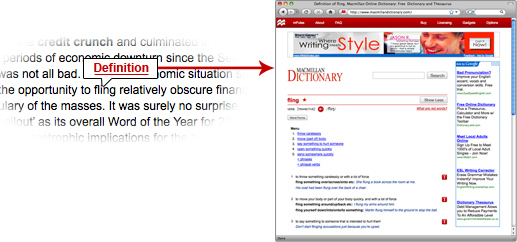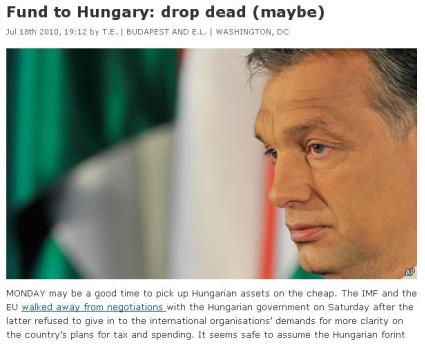Read
the text and DO
THE EXERCISE to check your understanding level.
TIPS
»
Now it is not important to know the exact meaning of the words,
only to understand the sentences. For unknown words you can
use the glossary or the "double-click" dictionary,
but first always try to find out the meaning of a word from
its context.
»
To
look up a word, double click on it or mark more than one word
with the cursor, then click on "Definition", and in
the opening window choose the appropriate word (for pronunciation
click on the  icon).
icon).

»
Check the level of your understanding by doing this exercise:
http://www.englishexercises.org/makeagame/viewgame.asp?id=4577
Fund
to Hungary: drop dead (maybe)
Extracts
for learning English, you can find the original article here:
The Economist 18th July 2010
http://www.economist.com/blogs/easternapproaches
MONDAY
may be a good time to pick up Hungarian assets on the cheap.
The IMF and the EU walked away from negotiations with the Hungarian
government on Saturday after the latter refused to give in to
the international organisations' demands for more clarity on
the country's plans for tax and spending. It seems safe to assume
the Hungarian forint will start the week with a sharp lurch
downwards.
/.../
All
parties said talks would resume, but the uncertainty is the
last thing Hungary, or any other emerging market needs to
see right now.
The
EU and the IMF wanted to see a commitment to spending cuts,
reforms to ill-run state enterprises like the railways, and
a clearer picture of how the government would be raising revenues.
One
bone of contention was the government's planned windfall tax
on banks and other financial institutions - from which it
is hoping to raise some Ft200bn (EU700m) a year over the next
two years. Assuming it works - and Italy's Unicredit or Austria's
Erste have plenty of other places to put their money - the
international lenders wondered whether a windfall tax was
a good basis for sound fiscal policy.
The
IMF called for 'durable, non-distortive measures,'
'Difficult decisions will be needed not only on the revenue
side - where the high financial sector levy, which is likely
to adversely affect lending and growth, is planned to be temporary
- but also on the spending side.'
/.../
As
Nomura said in a note, the failure to issue a polite communique
is:
'...a
very rare event, countries usually go out of their way to
satisfy these missions. The IMF has said indeed that they
didn't even get to discuss the extension as they didn't reach
agreement on the current SBA.'
This
was not a government dead set on pleasing its guests. Local
media reported during the negotiations that the IMF was not
pleased that Viktor Orban, the prime minister (pictured),
chose to be in South Africa watching the World Cup final when
the delegations arrived. Nor can it have helped that Sandor
Csanyi, head of OTP, Hungary's largest bank, was there at
the same time. It was also unfortunate that an amendment to
the windfall tax law was introduced while the IMF was in town,
one which would exclude seven insurance companies set up since
2007 from the tax, including one on whose board sits a key
economics adviser to Mr Orban, along with several politicians
from his Fidesz party.
One
explanation for this intransigence is that Fidesz is under
pressure. The party won a landslide election victory just
three months ago with promises to 'save the healthcare system',
spur economic growth and, above all, cut taxes. Last year's
fiscal consolidation came at great social cost, and the outgoing
government paid a heavy political price for it. The banking
tax is an attempt to square the circle.
Local
elections are due in October, and yapping at Fidesz's heels
is Jobbik, a far-right nationalist party even less obeisant
to the etiquette of international finance than Fidesz.
This
was their response to the debacle:
'We
can guess at the choreography that will follow from Monday:
politicians, analysts and journalists serving the global financial
powers will lay into the government for not giving into foreign
pressure. Jobbik will not be part of this... The discussions
with the IMF and the EU are a key front in the fight for economic
independence,' they wrote, evoking the spirit of the
'fight for independence' that followed the 1848 revolution
against the Hapsburgs in Vienna.
From
inside the country, the government feels pressure to take
a bolder, even reckless, approach. Mr Orban himself talked
about 'debt rescheduling' in remarks to businessmen
two years ago. Austerity has its limits. So does lenders'
patience.
|
 STEP
1 »
STEP
2 »
STEP
3 (Coming
soon!)
STEP
1 »
STEP
2 »
STEP
3 (Coming
soon!)